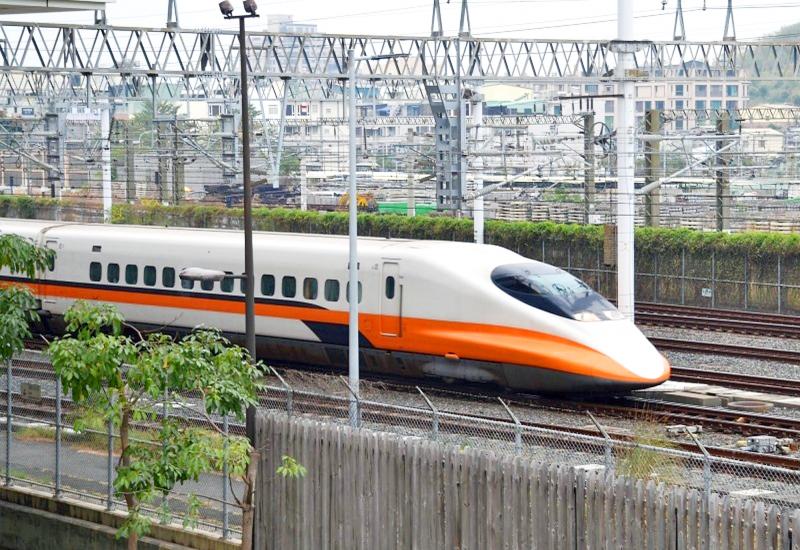Taiwan High Speed Rail Corp (THSRC, 台灣高鐵) is expected to recover quickly from the effects of COVID-19, as life returns to normal and thanks to the government’s domestic travel incentives, Yuanta Securities Investment Consulting Co (元大投顧) said in a note on Friday.
THSRC’s business might have bottomed out after revenue fell 49.83 percent year-on-year to NT$2.03 billion (US$67.59 million) in April, the lowest in nearly 10 years, while combined revenue in the first four months dropped 26.44 percent to NT$11.63 billion, as the COVID-19 outbreak reduced ridership, the investment consultancy said.
“The worst should be over in April as domestic tourism has started to resume in May after a half month without local coronavirus cases and THSRC carried out a promotion plan for students from May 27 and will provide more plans for all types of groups such as commuters,” Yuanta analyst Elle Yang (楊郁容) said in the note.

Photo: Wu Cheng-fung, Taipei Times
THSRC on Friday said that it is to provide six extra services per week from today and add 33 extra services during weekends from Friday next week to meet increased demand due to the government’s incentive programs for domestic tourism as the coronavirus situation stabilizes, the company’s Web site says.
“The ‘disease prevention tourism’ policy to be launched by the government by providing subsidies for tourism accommodation on July 1 should stimulate the domestic tourism industry and also increase demand for THSRC,” Yang said.
As people reduced their use of public transportation for tourist and business trips amid the COVID-19 outbreak, THSRC’s daily average ridership fell 17.2 percent year-on-year to 151,000 people in the first quarter, while its passenger load factor dropped to 53.7 percent, compared with 67.5 percent a year earlier, a company document released after an investors’ conference on Thursday showed.
As a result, the high-speed railway operator reported that net income decreased 50.63 percent year-on-year to NT$1.13 billion in the first quarter, with earnings per share of NT$0.2, the lowest in three years, company data showed.
Yang said that the company’s ridership and load factor recovered gradually last month.
Its sales are expected to decline year-on-year this month and the next, narrowing notably in July after promotion plans are offered, she said.
While border restrictions might continue, they would have little effect on operations, as foreign tourists constitute less than 10 percent of THSRC’s ridership, she added.

In Italy’s storied gold-making hubs, jewelers are reworking their designs to trim gold content as they race to blunt the effect of record prices and appeal to shoppers watching their budgets. Gold prices hit a record high on Thursday, surging near US$5,600 an ounce, more than double a year ago as geopolitical concerns and jitters over trade pushed investors toward the safe-haven asset. The rally is putting undue pressure on small artisans as they face mounting demands from customers, including international brands, to produce cheaper items, from signature pieces to wedding rings, according to interviews with four independent jewelers in Italy’s main

Japanese Prime Minister Sanae Takaichi has talked up the benefits of a weaker yen in a campaign speech, adopting a tone at odds with her finance ministry, which has refused to rule out any options to counter excessive foreign exchange volatility. Takaichi later softened her stance, saying she did not have a preference for the yen’s direction. “People say the weak yen is bad right now, but for export industries, it’s a major opportunity,” Takaichi said on Saturday at a rally for Liberal Democratic Party candidate Daishiro Yamagiwa in Kanagawa Prefecture ahead of a snap election on Sunday. “Whether it’s selling food or

CONCERNS: Tech companies investing in AI businesses that purchase their products have raised questions among investors that they are artificially propping up demand Nvidia Corp chief executive officer Jensen Huang (黃仁勳) on Saturday said that the company would be participating in OpenAI’s latest funding round, describing it as potentially “the largest investment we’ve ever made.” “We will invest a great deal of money,” Huang told reporters while visiting Taipei. “I believe in OpenAI. The work that they do is incredible. They’re one of the most consequential companies of our time.” Huang did not say exactly how much Nvidia might contribute, but described the investment as “huge.” “Let Sam announce how much he’s going to raise — it’s for him to decide,” Huang said, referring to OpenAI

The global server market is expected to grow 12.8 percent annually this year, with artificial intelligence (AI) servers projected to account for 16.5 percent, driven by continued investment in AI infrastructure by major cloud service providers (CSPs), market researcher TrendForce Corp (集邦科技) said yesterday. Global AI server shipments this year are expected to increase 28 percent year-on-year to more than 2.7 million units, driven by sustained demand from CSPs and government sovereign cloud projects, TrendForce analyst Frank Kung (龔明德) told the Taipei Times. Demand for GPU-based AI servers, including Nvidia Corp’s GB and Vera Rubin rack systems, is expected to remain high,